Daily Writing
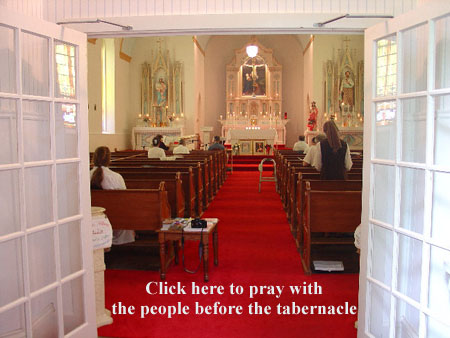
| Shepherds of Christ Daily Writing |
 |
March 19, 2007
March 20th Holy Spirit Novena
Scripture selection is Day 3 Period II.The Novena Rosary Mysteries
for March 20th are Sorrowful.
Sidney Rosary
will be March 20th - 6:20pm
Please tune in!
March 19, 2007 - Feast of St. Joseph
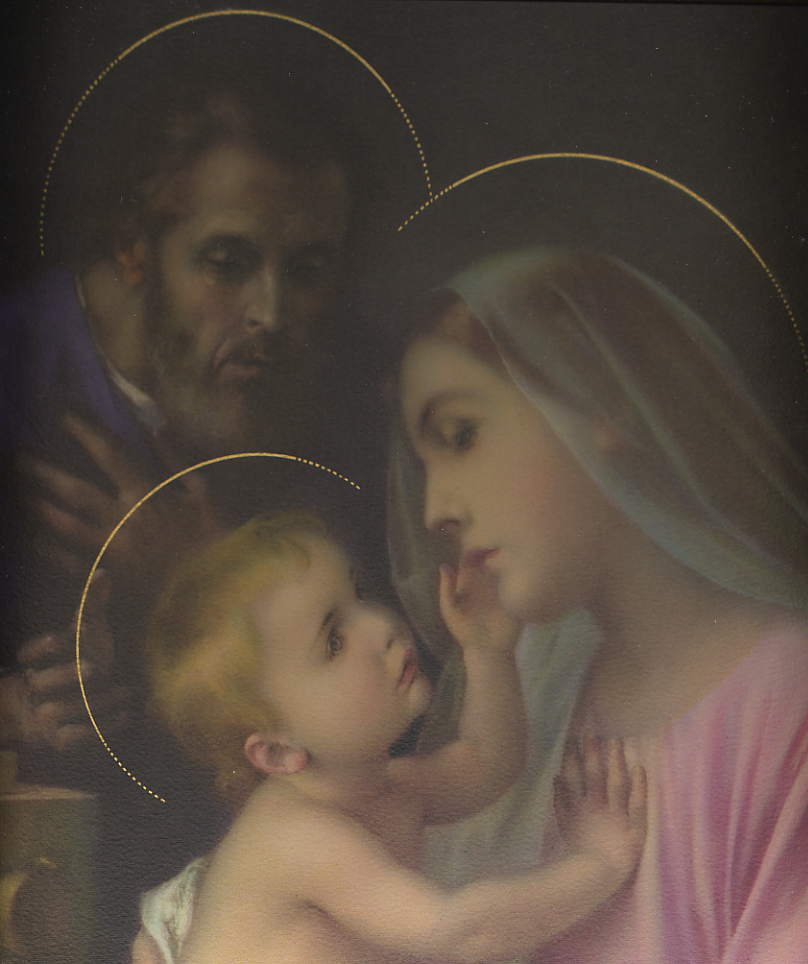
Excerpt from Mother at Our Side by Fr. Edward Carter, S.J.
thirteen
St. Joseph
... the angel of the Lord appeared to Joseph in a dream and said, "Rise, take the child and his mother, flee to Egypt, and stay there until I tell you. Herod is going to search for the child to destroy him." Joseph rose and took the child and his mother by night and departed for Egypt. (Mt. 2:13-14).
Since St. Joseph is the Patron of the Universal Church, it is fitting that we place this chapter on Joseph immediately after our chapters on the Church and the Church's liturgy.
The above Scripture passage reminds us that Joseph was the protector of Jesus and Mary. Being the foster father of Jesus and the husband of Mary, Joseph had the extraordinary privilege and responsibility of taking care of them.
Because of his privileged position regarding Jesus and Mary, Joseph's role in Christianity is both powerful and diverse. Besides being Patron of the Universal Church, he also has many other titles. In the Litany of St. Joseph he is invoked as patron of workers, families, virgins, the sick, and the dying. In papal documents and by popular acclaim he has been hailed as patron of prayer and the interior life, of the poor, of those in authority, fathers, priests and religious, travelers, and because of his closeness to Our Lady, as patron of devotion to Mary.30
Let us ask Joseph—this man who enjoyed extraordinary intimacy with Christ and Our Blessed Mother—to aid us in coming closer to Jesus and Mary. Let us ask Joseph, patron of prayer and the interior life, to help us develop that spirit of silence and prayer which is so necessary if we wish to grow in union with Christ and Mary our Mother.
Joseph will aid us in focusing our attention more and more upon Jesus and Mary. He is a powerful intercessor who desires to help us live out our daily consecration to the Heart of Christ and to the Immaculate Heart of Mary. In Joseph we have a great model in what constitutes this gift of self. Each day he committed himself to Christ and the Blessed Virgin. His gift of self was extraordinary.
St. Teresa of Avila, one of the greatest teachers of the spiritual life, had an outstanding devotion to St. Joseph:
"I do not remember ever having asked anything of St. Joseph that he did not grant me, nor can I think without wonder of the graces God has given me through His intercession, nor of the dangers of soul or body from which he has delivered me."31
____________
30. New Catholic Encyclopedia (New York: McGraw Hill Book Company, 1967), Vol. VII, p. 1111.
31. Michael Gasnier, O.P., Joseph the Silent (New York: Kennedy & Sons, 1962), p. 9.
Patron of the Church
At first Joseph didn't know
what to do
he was convinced in a dream.
When Jesus was 12 years old
Mary and Joseph took Jesus to the
temple.
JESUS WAS IN the 13th Year
Joseph is the Patron of a Holy death
Joseph must have had Mary and
Jesus by His side when he
died.
We too want Mary and Jesus and Joseph
by our side when we die.
Next week is the Feast of the
Annunciation
Mary calls us to peace
March is the Feast of St. Joseph
and 6 days later the
Feast of the Annunciation
The greatest of all is
love
1 Corinthians 13: 13
As it is, these remain: faith, hope and love, the three of them; and the greatest of them is love.
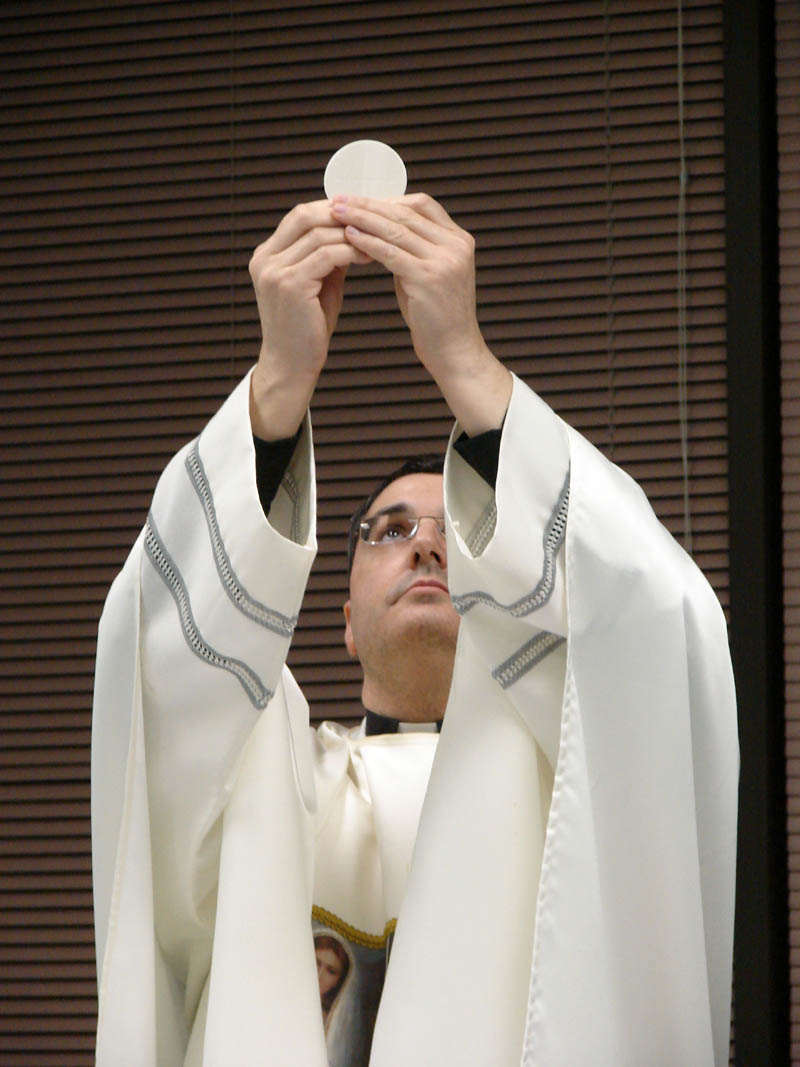
From Light, Happiness and Peace by Fr. John J. Pasquini p. 106-109
Theological Virtues of Faith Hope and Love
Faith
Faith is a gift (Eph 2:8) aided by the gift of understanding which is in conformity with reason, yet transcends the limits of reason.185 Faith in the illuminative stage is freed to a great extent of all aspects of egoism, passions, jealousies, whims, etc., of all that can damage our response to the inner call of grace. For some at this stage, faith is greater in the faculty of the intellect, thereby producing the fruits of certitude and firmness in actions. In others, faith is greater in the will, thereby producing the fruits of devotion and confidence.186 In either case, all aspects of life are being guided by the light of faith, which guides the individual to his or her eternal destiny of loving God for being God (Rm 8:28).
1) Mortal sins are a thing of the past, since love has conquered that inclination.
2) Because of love, earthly things such as pleasures, honors, wealth, etc., are no longer of great interest.
3) Because of love, we seek to be engulfed in the presence of God, to love him, to think of him, to adore him, to pray to him, to thank him, to ask his pardon, to aspire to him.
4) We desire, out of the grace of love, to please God more than anything and anyone in the entire created realm of reality.
5) We seek to love and know God in our neighbor, in spite of the neighbor’s defects. We love our neighbor for simply being a child of God, a child of God who is beloved by God. In the illuminative stage we love God in our neighbor and our neighbor in God. Love of God and love of neighbor merge into one reality.
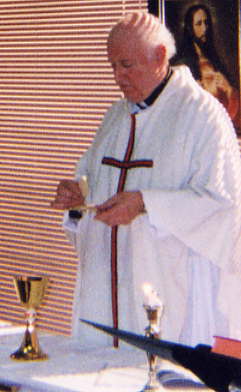
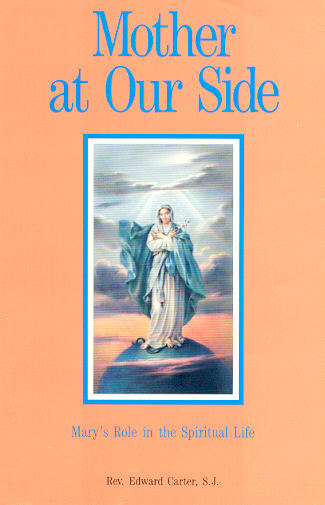
Excerpt from Mother at Our Side by Fr. Edward Carter, S.J.
ten
Mother Of Our Christian Virtues
Being mother of our Christ-life, Mary is also mother of our life of Christian virtues. Many of them are listed above, including the three most important ones—faith, hope, and love.
Faith
Ideally, faith is the commitment of one's entire being to the truth of Jesus. We must live the truth of Jesus, not merely intellectually assent to it. We properly comprehend religious truth only when we live it, savor it, experience it to the depths of our being. How much more we understand the truth of Christ in its wisdom, power, and beauty when we not only believe this truth with our graced intellects, but also allow it to permeate and transform our entire existence. As a corollary, we see the danger of intellectually assenting to Christ's truth without attempting to live accordingly. Faith can grow weak and even die if there is a constant and serious division between what we believe and the manner in which we live.
When we live according to faith, we are living according to a vision of God, humanity, and the rest of creation. Faith tells us things about God and creation we could either not otherwise know or know only with greater difficulty and with less certainty. A good example of the former is the doctrine of the Blessed Trinity. Reason can never arrive at this sublime truth. Only the intellect that has been elevated with the grace of faith can believe in the Triune God. If we are to progress in the spiritual life, we must allow this vision of faith to more and more influence our activities. Increasingly, we should become contemplatives in action. The more we allow Mary to lead us into such a way of life, the more our lives will have meaning for ourselves as well as for the betterment of the lives of people around us. As our mother, she happily guides us to the peace we can find as contemplatives in action.
The vision of faith should inspire us to action according to our vocation, talents, opportunity, time, and energy. We should always strive to make the world more reflective of Christ's image. To the extent we do not, we are betraying the vision of faith.
Mother Mary, deepen our faith. Help us to follow ever more closely the light of faith. And we pray, dear Mother, that you will lead us ever closer to your Son Who is Himself the source of faith's light.
Hope
Christian hope is a virtue that allows us to desire God as the goal of our existence. Hope also allows us to trust that God will grant us the graces necessary to achieve this goal.
The necessity of hope in our lives is obvious. Without a sustained desire for God we will not be able to live as we should. If God is not our goal, then our lives will be miserably shaped by something infinitely less, whether it be money, sex, social status, or anything else that can grip the human heart as an unauthentic end rather than as a legitimate means to God.
Without God's grace we cannot initially attain supernatural life, we cannot maintain ourselves in it, and we cannot grow in it. At times God allows us to strikingly and intensely experience how helpless we are without Him. Such episodes in the spiritual life can be very painful, but they are also opportunities for great growth. We are meant to emerge from these experiences with an increase of trust in God. We realize how weak we are in ourselves, but how strong we are if we rely on God.
One of Mary's functions as our spiritual mother is to help us grow in trust. In countless ways Mary shows us her maternal love. If we are to love her in return, if we are to allow her to increasingly possess us, we must trust her.
We should always remember: when we trust Mary, we are putting our trust in God; when we abandon ourselves to Mary, we are abandoning ourselves to God.
Love
St. Paul tells us:
If I speak in human and angelic tongues but do not have love, I am a resounding gong or a clashing cymbal. And if I have the gift of prophecy and comprehend all mysteries and all knowledge; if I have all faith so as to move mountains but do not have love, I am nothing. If I give away everything I own, and if I hand my body over so that I may boast but do not have love, I gain nothing. (1 Cor. 13:1-3).
The above words of Paul point out the great importance of the virtue of love. Love is the Christian virtue. Jesus Himself has summarized Christianity in terms of love; all the other virtues variously serve love's purpose.
As Jesus walked this earth, His life was a life of love. He mightily loved His Father. With a deep and tender love He loved all members of the human race, and He would die an agonizing and horrible death for them. One of the members of this race He loved in an extraordinarily special way—His Mother Mary. And she was the one person created who could return that love in a perfect way. By following her example, we can also learn to love more perfectly.
The poverty, the hiddenness, the disappointments, the weariness, the joy and the happiness, the pain and the agony—all that constituted the earthly life of Christ was experienced within the framework of love. Jesus loved in everything He did—tenderly, manfully, with understanding and sympathy. He loved with a complete devotedness and a deep, sincere concern for the individual. He loved with a passion for that which is true and good and beautiful. He loved with a complete conformity to His Father's will. He loved always and completely. He loved with a gift of Himself, always pouring Himself out, even to the extreme of death on the wood of a cross. This was the poignant beauty of Christ's life.
Christ shows us His Heart as the symbol of this life of love. It is a symbol which calls for our love in return. The Heart of Christ, source of our own capacity to love, calls us to imitation. Christ, in revealing His Heart to us as symbol of His love, invites us to the closest discipleship as He leads us along the path of love.
We can be tempted to reject this marvelous example of love which Jesus has left us. We can seek our own greatness and fulfillment in a manner which necessarily results in disappointment. We can strive after greatness in ways which God does not intend. These wayward wanderings, however, result in a feeling of dissatisfaction and frustration and we will eventually come to realize they have betrayed us because they are not rooted in Christ and His way of life—the way of true personal greatness.
We grow as Christians as we grow in love. We exercise this love within the milieu of the human condition. This is the only framework we have for achieving our greatness, and, consequently, we must not shirk this human condition. Jesus did not shirk it, but rather accepted it and manifested His greatness within it, despite the pain and even agony that the human condition at times heaped upon Him. It is true that Jesus rejoiced during the course of His life because of the goodness, sincerity, and response of some of those with whom He dealt. For example, the love which Mary and Joseph showered upon Jesus gave Him great joy. During His life, however, Jesus often suffered because of the evil side of humans—their pettiness, cowardice, insensitivity, selfishness, egotism. In other words, Jesus suffered at the hands of others because they were not what they should have been. Nonetheless, these experiences did not thwart the greatness of Jesus. Jesus was always the tremendous lover, and He loved even at those times when it was very painful to do so.
As Christ suffered because of others, we, too, as we try to love, suffer because of others. We may suffer because others do not always understand us—this can be true even of those who dearly love us. We may suffer because some do not appreciate what we do for them, sometimes at great personal cost, or because others reject us, or make us the objects of their meanness and selfishness. We may suffer because there are some who ignore us. At times we suffer so much that we are tempted to quit loving as we should and are tempted to withdraw from the pain of giving ourselves to an egotistic world. To surrender to such a temptation, however, is to forget what true Christian greatness really is—namely, a life of love for God and others, a love that does not shrink from the pain that results from loving in an imperfect world, a love that is meant to become greater regardless of the way others might treat us. Christian love, then, accepts both the pain and the joy of life and carries on under both conditions.
We should ask Mary our mother, who takes such great pride in us when we love as we should, to lead us daily to the Heart of her Son. This Heart, burning furnace of charity, is the source we must draw from if we are to love and progress in love.
Lead us, dear Mother, to this Heart of your Son. As we rest secure in the love of your Immaculate Heart, instill within us daily a growing desire to take on the likeness of the Heart of Jesus. Obtain for us, dearest Mother, the grace to make the Heart of Jesus the center of our existence. Living within this pierced Heart of Jesus, we will more and more be consumed with the desire to love God and neighbor. We will become increasingly aware that to truly live is to love.
Hebrews 11: 1-7
The exemplary faith of our ancestors
Only faith can guarantee the blessings that we hope for, or prove the existence of realities that are unseen. It is for their faith that our anestors are acknowledged.
It is by faith that we understand that the ages were created by a word from God, so that from the invisible the visible world came to be.
It was because of his faith that Abel offered God a better sacrifice than Cain, and for that he was acknowledged as upright when God himself made acknowledgement of his offerings. Though he is dead, he still speaks by faith.
It was because of his faith that Enoch was taken up and did not experience death: he was no more, because God took him; because before his assumption he was acknowledged to have pleased God. Now it is impossible to please God without faith, since anyone who comes to him must believe that he exists and rewards those who seek him.
It was through his faith that Noah, when he had been warned by God of something that had never been seen before, took care to build an ark to save his family. His faith was a judgement on the world, and he was able to claim the uprightness which comes from faith.
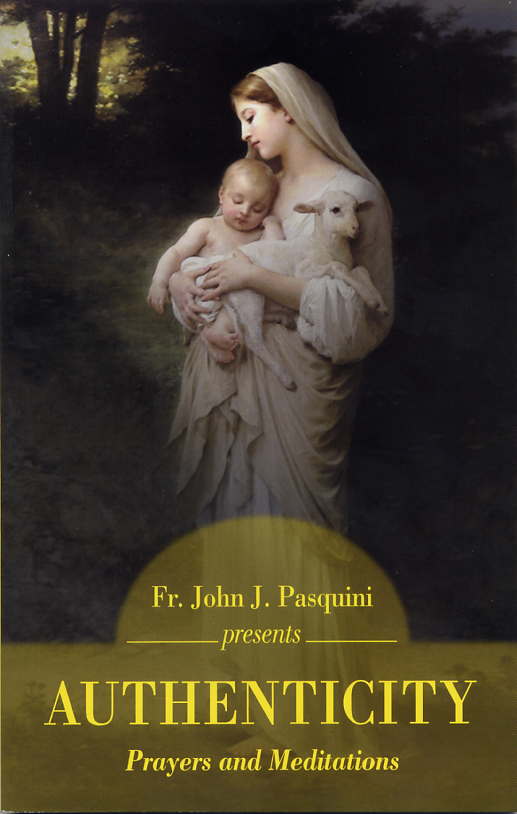
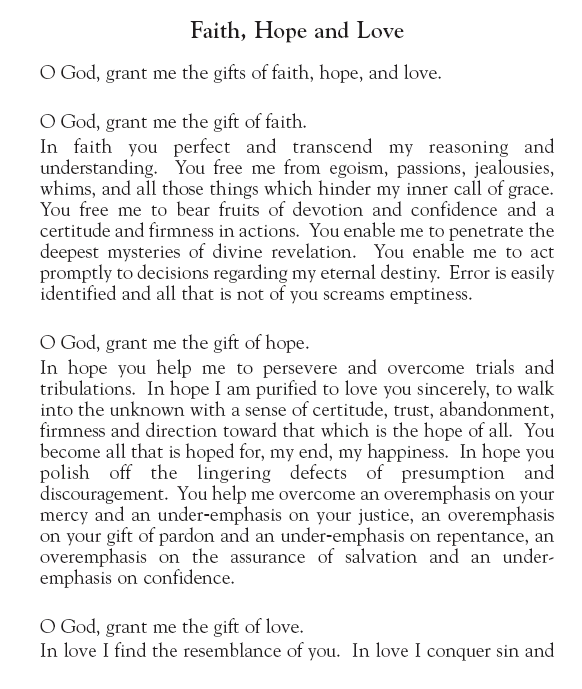
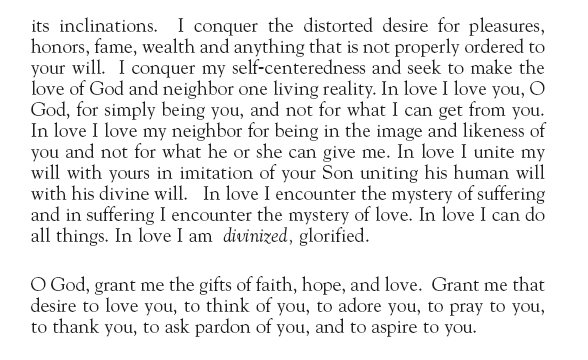
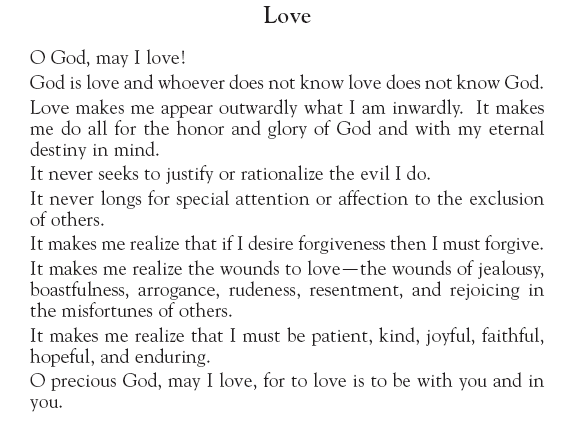
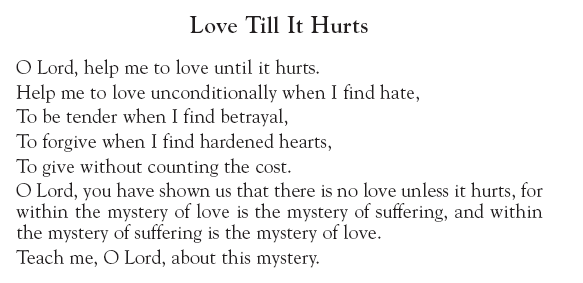
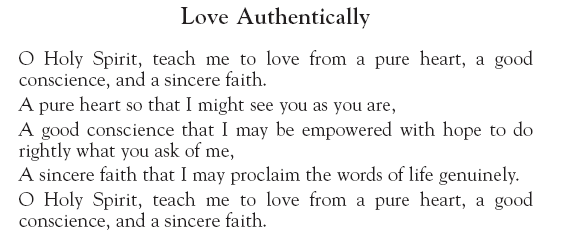
That is where you say yes to
Jesus when your wounded human
nature, your taintedness would
have you act another way —
you say yes to purity and love in
serving God according to His will
in love as He deserves.
It is easy to give into anger, judging,
not loving ways
Doing the holy thing may be like
pushing a snow ball up hill, but
you get stronger and stronger and stronger and
the snow ball bigger even though it
is hard.
The wounded human nature tends
toward anger, jealousy, envy, lust —
the wounded human nature can look
at others — judging incorrectly,
accusing, hating, condemning.
God wants us to be likened to
Him — we were created in His image
and likeness.
One grows in faith when one acts
in faith — Faith is a cardinal
virtue.
One can look at everything with
a dismal point of view, negatively.
One can assume the worst — be
angry at God and others — hate oneself —
hate the sinner — rather than loving
the sinner and hating the sin.
We can pray to have hope.
We can pray for a way of acting
in hope.
Jesus died on the cross — despite
all the sins of all the people —
He knew all that would be
condemned forever to hell for
their sins —
Jesus died for the sinners.
We must pray for the vision of
the Father —
John 3: 16
For this is how God loved the world: he gave his only Son, so that everyone who believes in him may not perish but may have eternal life.
Judgmental — some times people are
just looking to condemn
a person who is loving and
doing God's will.Like in the scriptures
What Joseph's brothers did to him.We are all guilty of seeing with
tainted vision we can't help it —we have a weakness because of
original sin, but we must fight
against it.Go to confession.
Go to the Eucharist.
Sit before Jesus in the Blessed Sacrament.Last is love —
We must work to be loving —
The more we are filled with His light
and His grace — the more we act
as He wants us to act —Going to adoration for one hour daily
fills us with His grace.Do we have a time we set aside?
Do we have a Church we like to
go to?Do we think of a million excuses
how we need to help others when
we are about to go in the
door?Do we drive there to the Church where
the Blessed Sacrament is?Are we tempted to leave after 20
minutes because we can hardly
sit there —If we make the decision to stay at the
beginning we will be less tempted.Doesn't Jesus deserve our love —
In being more one with Jesus, who is
love, I become more loving
acting like Him.
Special Offer
Fr. John J. Pasquini's book
Light, Happiness and Peace
$5.00 plus postage
Call Glaci
1-888-211-3041
For this one time special offer we
offer these books so you can
spread these special prayers.
The book Light Happiness and Peace is a
companion to the
Authenticity book of prayers —
it is a masterpiece —
$5.00 plus postage
This will help spread these beautiful
writings and prayers for lent.
This will help us with the Newsletter.